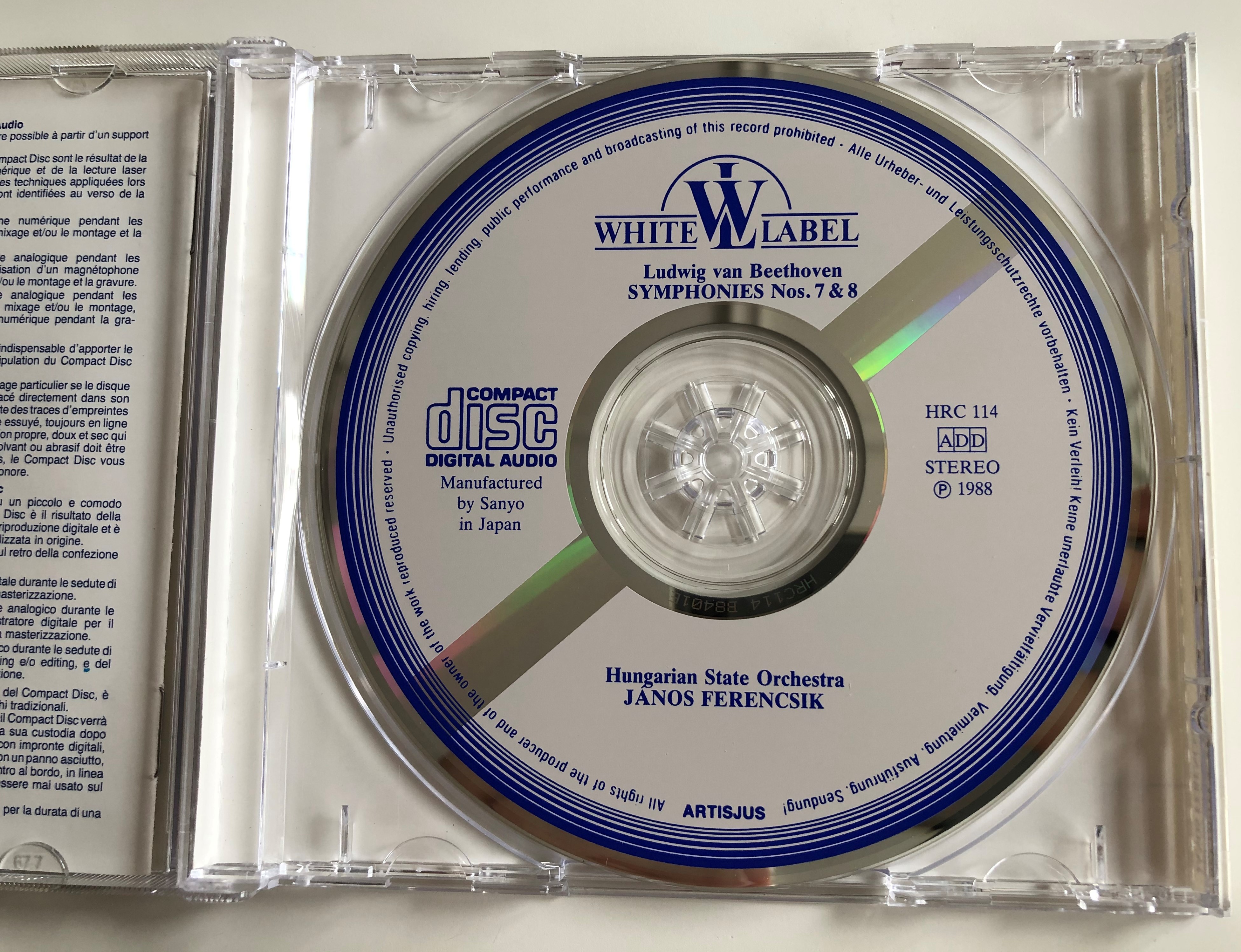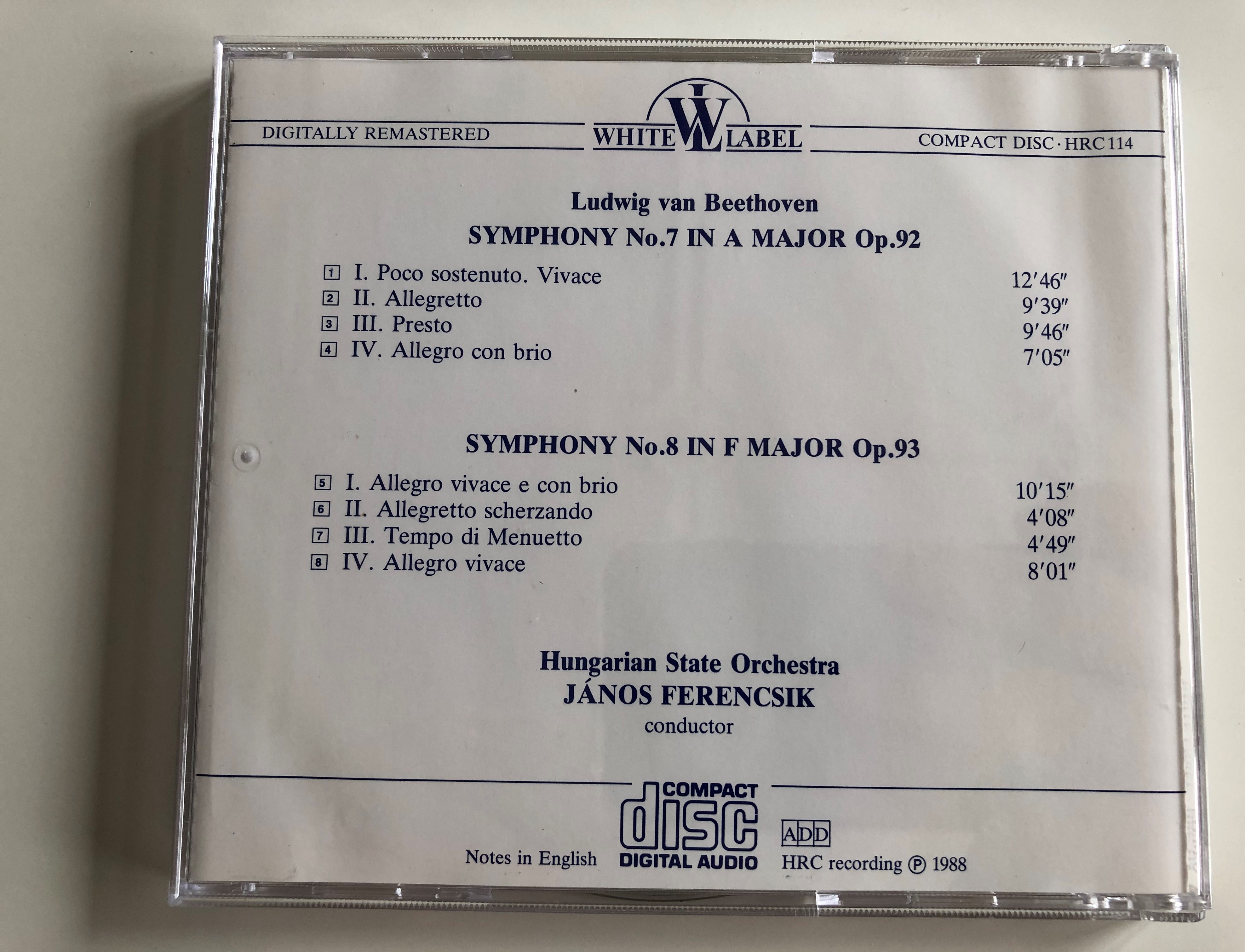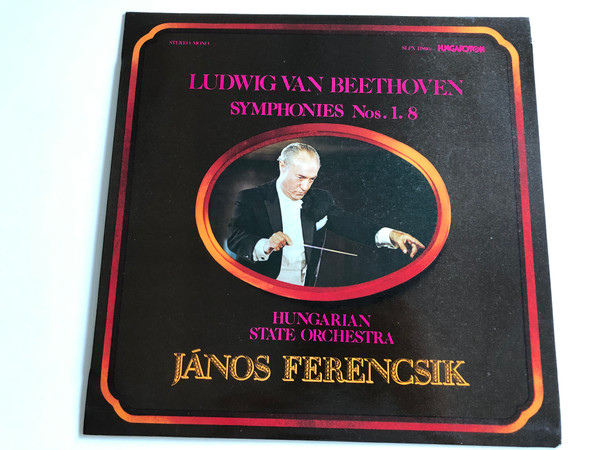Description
Beethoven – Symphonies Nos. 7 & 8 / Hungarian State Orchestra, János Ferencsik / Hungaroton Audio CD 1988 Stereo
HRC 114
ASIN: B07QG2PCBG
Product Details:
The seventh symphony is almost on par with Ferencsik's fourth. The sound, as in the Pastoral, is better than it is elsewhere in this cycle though it remains light in the bass. Even better, the tuning of the violins is more secure. Ferencsik projects the introduction confidently, taking a broad tempo and drawing some lovely sounds from his winds above teasingly slow ascending strings. The main allegro charms with perky string interplay and a dancing solo flute. If it fails to become exuberant, it is enjoyable nevertheless. The second movement contrasts nicely: the orchestra sinks to a real pianissimo, and the broad tenuto of the strings marks out a funereal tread to rival that of the Eroica's second movement. A pleasing rather than exciting third movement follows, but the balancing if parts between strings, horns and trumpet in the trio is superb. The finale is taken at a moderate tempo, and although ensemble is not as tight as would be ideal, it brings the symphony to a bright conclusion.
The eighth symphony was recorded a year later than the seventh, but the sonic picture has less body. It is also not as strong a reading, with fallible violins contributing to a performance lacking in tension. In the first movement, parts are well balanced and there is a beautifully blended passage of woodwind playing at around the 8:40 mark. Still, while the lyrical passages emerge fresh, the dramatic material is little laboured and the movement lacks the impetus that should power it from within. The second movement is bright, but let down by those violins. In the third movement it is the tuning of the winds that disappoints, though there are moments of beauty including some lovely blended pianissimo horn playing. The finale, which fails to sparkle, brings an unimpressive performance to a close.
János Ferencsik (18 January 1907 – 12 June 1984) was a Hungarian conductor.
Ferencsik was born in Budapest; he actively played music even as a very young boy. He took violin lessons and taught himself to play the organ. He studied at the National Conservatory of Music in Budapest, where his major subjects were organ performance and composition. He joined the Budapest State Opera at the age of twenty, where he was engaged as a rehearsal coach. In this capacity he took part in the Bayreuth Festival in 1930-31.
At Bayreuth, he assisted Arturo Toscanini, an experience which was to be of decisive importance for the remainder of his career. Between the two world wars, he studied in Budapest under such conductors as Arturo Toscanini, Bruno Walter, Felix Weingartner and Wilhelm Furtwängler.
Ferencsik's international career began in 1937. By the end of the 1930s, he became one of the Hungarian Opera's leading conductors. He conducted the farewell concert of Béla Bartók and Ditta Pásztory-Bartók in 1940 in Budapest, just before Bartók had left the continent. His artistic career came to full fruition after 1945, as he was appointed General Music Director of the Budapest Opera, Principal Conductor of the Hungarian National Philharmonic Orchestra in Budapest and, from 1960 until 1967, and the Conductor Chairman of the Budapest Philharmonic Orchestra. From 1948 until 1950, Ferencsik was principal guest conductor of the Vienna State Opera, he was guest conductor of the Los Angeles Philharmonic, and toured widely abroad, conducting on every continent with the exception of Africa,
Ferencsik was a friend of Hungarian composers László Lajtha, Béla Bartók and Zoltán Kodály and was known for his interpretations of their works. Among his many recordings are two of Kodály's Székelyfonó. Notable students include Alexander Raichev.
Tracklist:
| Symphony No. 7 In A Major Op. 92 | ||
| 1 | I. Poco Sostenuto. Vivace | 12:46 |
| 2 | II. Allegretto | 9:39 |
| 3 | III. Presto | 9:46 |
| 4 | IV. Allegro Con Brio | 7:05 |
|
Symphony No. 8 In F Major Op. 93 |
||
| 5 | I. Allegro Vivace E Con Brio | 10:15 |
| 6 | II. Allegretto Scherzando | 4:08 |
| 7 |
III. Tempo Di Menuetto | 4:49 |
| 8 | IV. Allegro Vivace | 8:01 |
- Composed By – Ludwig van Beethoven
- Conductor – János Ferencsik
- Orchestra – Hungarian State Orchestra





























